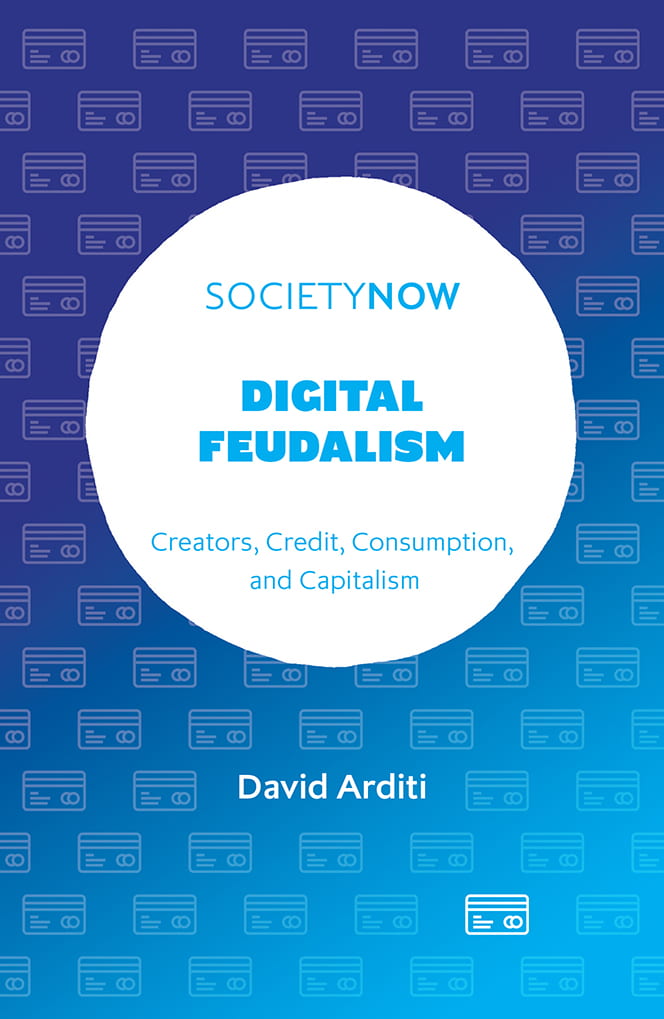
Digital Feudalism
Creators, Credit, Consumption and Capitalism
David Arditi
Publication: 6th April 2023
PB, $24.99, ISBN: 9781804557693, Emerald Books
Digital Feudalism explores the shifting nature of the global economy. As people and corporations deploy digital technology, the way we work, consume and pay for things has changed dramatically. This marks a new moment in capitalism.
Under this new ‘digital feudalism’, people find precarious employment via digital platforms and buy goods and services in perpetuity through subscriptions. We’re paying to continually stream cultural content online, workers are using smartphone apps in the gig economy, and – with increased consumption and lower wages – debt is rising among the masses.
Center for Theory Director, Dr. David Arditi observes that the top three Netflix shows of 2021 were non-English speaking critiques of capitalism. Money Heist, Lupin, and Squid Game follow characters who have nothing left to lose in an economic system that placed the protagonists in dire circumstances. It’s fitting that these shows are available through Netflix, a streaming platform driving changes in the way we consume culture. In effect, Netflix appears as a microcosm of the general shifts to the economic system.
In Digital Feudalism, Arditi gives an overview of the evolution of capitalism and shines a light on our current model of unending consumption as we buy increasingly more, but own less. He argues that influencers and content creators are celebrated as savvy entrepreneurs but in reality, are making money for corporations, while the Metaverse is an attempt to turn all movements and thoughts into data that can be sold or deployed in other ways through a process of enclosure.
He concludes by turning his attention to the economic impact of the pandemic which created precarity for many workers as well as highlighting a digital divide, with many employers failing to support staff during their transition to home working by funding access to the internet or the purchase of office furniture.
In Arditi’s fascinating exploration, he presents digital feudalism as a moment of capitalist retrenchment – a system that alienates everyone, further encloses our existence in capitalism and doubles down on exploitation
About The Author:
David Arditi is an Associate Professor of Sociology at the University of Texas at Arlington and a recognized expert on digital technology and streaming cultures.
For a review copy of Digital Feudalism or for an interview with David Arditi, please contact:
Katherine Lowe, The Oxford Publicity Partnership Ltd,
Tel: 07887 948795 or email: katherine.lowe@oppuk.co.uk
Endorsements:
“In Digital Feudalism, Arditi draws a straight line from Netflix to the emerging Metaverse, warning us all that the only winners in a process of endless consumption and accelerated obsolescence are the big corporations who are taking more and more value from everyone else as part of an extractive economy. The book is compelling, highly readable for a range of audiences, and deeply unnerving, framed by Squid Game as a metaphor for the new digital era, with just one exception: everyone loses.”
– Tama Leaver, Professor of Internet Studies, Curtin University
“…Through an analysis of cases that exhibit the structures and practices associated with digital feudalism—subscription services, gig work, Amazon, influencers, the metaverse, and crowdfunding to name a few—Arditi reframes the strike-waves and the composition of movements to come with a warranted note of pessimism regarding capital’s “savage” capacities for adaptation. Stitching together the best of critical social theory and cultural studies, Arditi offers readers a clear and crucial lens on our current conjuncture. The prognosis? Digital Feudalism specifies that the center no longer holds. Rather, we face a less-comfortable, rougher, and far-less reasonable, democratic unfreedom beyond which there is no clear horizon line for better or for worse.”
– Robert F. Carley, Associate Professor of International Affairs, Texas A&M University, College Station
Contents:
Chapter 1. Introduction: A Squid Game Reality
Chapter 2. Buy More, Own Less: Subscriptions and Unending Consumption
Chapter 3. Working on your own: Precarious labor in the gig economy
Chapter 4. Debt Peonage and Primitive Accumulation
Chapter 5. Amazon and Baron Bezos
Chapter 6. Unboxed: Content Creators and influencers
Chapter 7. Metaverse: enclosing new spaces
Chapter 8. From Patron to Patreon: Crowdfunding Information
Chapter 9. Conclusion: Fed-up While Locked Down